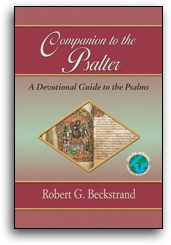SermonStudio
Praise The LORD! Praise, O Servants Of The LORD
Devotional
Companion to the Psalter
A Devotional Guide to the Psalms
Praise the LORD! ...
Who is like the LORD our God,
who is seated on high,
who looks far down
on the heavens and the earth?
He raises the poor from the dust
and lifts the needy from the ash heap.
-- Psalm 113:1a, 5-7
Theme: God's transcendence and humility
Outline
1-3 -- Praise Yahweh, praise his name.
4-6 -- Exalted above heaven and earth, he yet humbles himself and "looks far down" into the whole creation.
Who is like the LORD our God,
who is seated on high,
who looks far down
on the heavens and the earth?
He raises the poor from the dust
and lifts the needy from the ash heap.
-- Psalm 113:1a, 5-7
Theme: God's transcendence and humility
Outline
1-3 -- Praise Yahweh, praise his name.
4-6 -- Exalted above heaven and earth, he yet humbles himself and "looks far down" into the whole creation.


